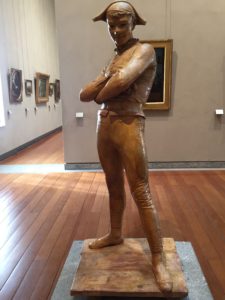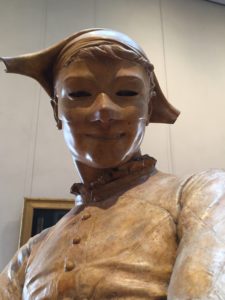Welcome, my friends, to another National Poetry Month.
This is my ninth April dedicated to writing daily haiku.
I’d love for you to join me!
Haiku 2
In the key of C
Sunday morning storms outside
become song in here

Welcome, my friends, to another National Poetry Month.
This is my ninth April dedicated to writing daily haiku.
I’d love for you to join me!
Haiku 2
In the key of C
Sunday morning storms outside
become song in here

Yep. Again with the haiku. It’s been nearly a decade now that I’ve devoted my April to haiku.
It’s National Poetry Month. This is my practice. Here goes…

Haiku 1, April 1
What’s necessary?
What’s luxury? What’s pure fun?
Clear the mind. Start fresh.
Happy April my friends!
xoxoxo
Tanita gifted us this lovely photograph as source material for our ekphrastic poems this month. (Crediting the Creative Commons…)

I played around with complicated forms and longer narratives but in the end I settled on this response, both short and simple. Enjoy it, and then go and read the others…
The Persistence of Trees
When a girl can’t reach
what she wants or needs
she grows up into herself,
the way a tree might stretch
deep from its taproot
into the generous cup of sky
in order to get the necessary
light, the light necessary
for it to flourish, to transpire,
to eventually cast
its own shadow.
The assignment? A villanelle.
The theme? Brevity, shortness.
The irony? Running out of time!
So let’s call this one a draft, shall we?
Just in under the wire.
Phew!

Stitch In Time
By Liz Garton Scanlon
Let’s make it quick – this hour’s not my own
I catch a borrowed breath but don’t exhale
The stitch in time has already been sewn
Each moment passes – sinks just like a stone
The second hand a whip that raises wales
Let’s make it quick – this hour’s not my own
But can a heartbeat really be postponed?
I hurry, my old story sounding stale
The stitch in time has already been sewn
The wormhole dropped through, wrinkle blown
The minutes meted out on God’s grand scale
Let’s make it quick – this hour’s not my own
but does it matter when I cut this close to bone?
What if I stop and let the measured gears derail?
The stitch in time has already been sewn
I rip the seams and start again alone
Shake off the fetters, lift the veil
And just like that, the hour is my own
The stitch in time, so carefully re-sewn
My pal’s poems:
Laura
Kelly
Tanita
Tricia
Sara
And for more wonderful everything, Poetry Friday is here…
Be well, my friends….
A new year would be incomplete without new poetry! I’ve gathered with my sisters-in-words once again to debut a new set of poems each month — all focused on a certain form, or theme, or both. I know — it sounds like last year. And the year before. But this time, of course, with new assignments!
So we’re starting with the Somonka — a Japanese form that is really just two tankas put together like love letters — so imagine two voices speaking the different stanzas. The rules for a tanka are five unlined rhymes, with 5/7/5/7/7 syllables, respectively.
I loved this form, and wrote several, but they all ended up with too much snark and not enough sweet. I’m sorry about that. I have a heck of a head cold. But regardless, here they are and let’s hope I’ll have softened up by next month. 🙂

A Love of Winter
Air brisk & cheeks pink
I love you, January
Everything feels new!
I jump out of bed for you
(Except when I just cannot)
Feckless southerner
I put my all into this
Thirty-one whole days
But you’re only game for three
Unrequited, I freeze up

Forget-Me-Not
Breakfast is at five
You forget, so I wake you
You’re so forgetful
You cup my ears in your hands
Ask, “Who’s this? Who’s a good boy?”
You stand under me
When I turn I nearly trip
Furry reminder
I’m not alone – you are here
You are always here for me

A Good Soak
Yes, I’m claw-footed
but I run hot and heavy —
I hold you, my dear,
in my porcelain embrace,
while you try to slip away.
I come for comfort
I long to be warm and held
but this is too still
and confining. Lethargic,
I find I must pull the plug.
To read more of these, click here!
Tricia
Sara
Laura
Tanita
Kelly
And for Poetry Friday, head to TeacherDance!
I’m on the road so am not able to devote time to a more lengthy post, but as the years comes to a close I’m grateful to have my Poetry Sisters with me, as always.
This month, we tackled another ekphrastic — using photos Andi took at Glencairn’s Cloister at the Glencairn Museum in Bryn Athyn, Pennsylvania.
It looks to be a place of pure, loveliness and it inspired this from me:

Look Up
Liz Garton Scanlon
There are times (like these)
when being somewhere beautiful (holy, almost)
becomes not just pleasant but necessary,
when being somewhere old (and lasting)
becomes not just reassuring but the way
to stay upright, as if a stone column could
serve as a spine, as if a medieval cloister
were the four chambers of one’s own heart.
There are times when we need to see (and trust)
that even granite can be carved into wool
and wings, that even the hardest wall
might soften in the face of dappled sunlight
and someone’s grand ideas.
There are times when we need to see (and trust)
that even when surrounded by manmade concerns,
we are lifted by looking up (by following)
the golden eagle and turtle dove into the sky.
And here are the others:
Sara Lewis Holmes
Kelly Fineman
Tanita Davis
Laura Purdie Salas
Tricia Stohr-Hunt
Andi Sibley
Well, hello autumn.
Hello, election season.
Hello, dark mornings and short days.
My sisters-in-verse and I have met another month with a poem. We chose gratitude as a theme because, well, tis the season. And lord knows we need to counter the dour daily energies and news stories and Twitter wars in the world right now.
And our form? The terza rima — a funny little slip of a thing that reminds me of knitting (ok, so I don’t knit but I’ve learned the basics several times) in that you pull a stitch from the middle of each stanza into the next one and build the rhyme scheme off of that. Throw a little iambic pentameter in and you’ve got yourself a poem.
I tried a couple. They weren’t easy. I felt constrained — more than I often do by form — but puzzles are supposed to keep us fresh, so what’s the harm? Here goes….

Gratitude in Rhyme
by Liz Garton Scanlon
Times like these, true gratitude’s a stretch –
days hammer on, the pitch of life insists.
Amazing grace that visits every wretch
(and finds and saves and otherwise persists)
seems strangely quiet, absent in the din,
as we reveal ourselves – we can’t resist.
Our darkest thoughts are matched by deed akin –
are we not better in our hearts than this?
What if we all start fresh, just now, begin:
Hot tea, good dog, obligatory kiss.
From there, go bigger – promise, listen, vote –
before you know it, moments of real bliss.
Because we have each other, we’re afloat.
We try, we love, we write this thank you note.

Half Empty or Half Full?
By Liz Garton Scanlon
My neck bends upwards, gazing at the moon.
I ask: is it half empty or half full?
It’s all in how you see this silver spoon,
this tree, its leaves; this sheep its autumn wool.
Is every thing just resting on the verge,
the push that feeds into tomorrow’s pull?
Even optimists raise up a dirge
into the void, the middle of the night –
the owl cries, all aching hearts converge.
But then it’s dawn: the breeze, the birds, the light.
Have faith, the moon will wax again to right.

And, in celebrating the end of another year writing with my favorite gals, why not run off and read their terza rimas, too?
Kelly Fineman
Tricia Stohr-Hunt
Tanita Davis
Sara Lewis Holmes
Laura Purdie Salas
Plus, while you’re at Laura’s, you can hook into all the Poetry Friday poems because she’s hosting today! Hurrah! Enjoy. Be well.
My pals and I have taken on quite a few ekphrastic challenges this year because, well — because we like them and we’re in charge! This month, Kelly provided the inspiration.

This statue, Arlequin, is by Rene de Saint-Marceaux and lives at the Musee des Beaux Artes in Lyon, France. I love this piece — it came alive for me completely and resulted in this:
Arlequin
By Liz Garton Scanlon
Hello, masked rascal, boy king,
Peter Pan with the cocky stance.
I knew you in high school,
you asked me to dance
and acted like it was my idea,
you threw frisbee, had a flask
were so sure that you could fly
and the water tower cried its siren cry.
But here’s the thing
with myths, they bleed together –
you’re a harlequin, an Icarus,
to the manor born and Shakespeare’s fool.
And what I want to say to you
is this: unmask the eyes,
obey the rules, grow up a bit.
It isn’t easy here, but harder
when you’re counterfeit.

You’ll want to see what the others have done, too!
Sara Lewis Holmes
Tanita Davis
Kelly Ramsdell Fineman
Tricia Stohr-Hunt
Laura Purdie Salas
And Poetry Friday’s being celebrated over at Violet Nesdoly’s place — enjoy!
I’m not one for absolutes, so when someone asks me about my favorite book of the year, I usually hedge my bet. Well, the delightful Eileen Manes at Pickle Corn Jam asked, and this post is my answer! (Please see below for posts by other readers and writers who share some of their new favorites, too!)
In picture book land, a current favorite of mine is OWL SEES OWL — a lovely, imagistic book that has more going on than first meets the eye.

The text is a reverso poem — a form created by the brilliant Marilyn Singer who popularized it in her spectacular book Mirror, Mirror. (Here’s a great post where she explains the form’s genesis and evolution.)
Laura Godwin, author of OWL SEES OWL, uses the reverso to take sweet owl out into the world — where he sees the night sky and the fall leaves and, eventually, his own reflection — and then to return him home again in the second half of the book — revisiting everything from earlier but with a new perspective.
That perspective’s aided by Rob Dunlavey’s gorgeous, warm, immersive artwork. (You can enjoy all the stages of its development here!)
I think it’s the idea of perspective that really makes this book special for me. It’s simple and quiet — both visually and textually — but it’s saying something big — that the world can be looked at in lots of different ways, through different lenses, at different times and from different angles. That, in fact, the world should be looked at with differing perspectives whenever possible.
Maybe it’s the mad election season, but that feels like a pretty resonant message right now.
Bonus book: For another absolutely gorgeous book that is all about perspective, check out Brendan Wenzel’s THEY ALL SAW A CAT. It’s up there in my top ten this year too. Enjoy!

For more favorites, have a look at these posts, all part of Eileen’s #pcjlinkup! Enjoy!
Cate Berry on The Snurtch
Charnaie Gordon on Little Red and the Very Hungry Lion
Danna Smith on Six Dots: A Story of Young Louis Braille
Eileen Manes on Best Frints in the Whole Universe
Henry L. Herz on Return
Karen Santhanam on Mabel and the Queen of Dreams
Kell Andrews on City Shapes
Keyosha Atwater on One Day in the Eucalyptus, Eucalyptus Tree
Vanessa Roeder on Horrible Bear
I think we all shared mixed feelings over this month’s form. The clogyrnach (say that 5 times fast!) ended up seeming kind of limericky to us. It’s a Welsh form that requires a certain number of lines (either 5 or 6), a certain number of syllables (32) and a very clear-and-simple aa,bb-type rhyme scheme. But something about the prescriptive nature of this form as opposed to the prescriptive nature of other forms felt a tad too, well, sing-songy and prescriptive to us.
Still, we did as we were told and wrote the darn things. Well, ok, I didn’t follow the end-line requirements to the letter of the law. In fact I pretty much broke the rule that there should be a b rhyme in the middle of the last line as well as an a rhyme at the end. I kind of did that once. So. Let’s call mine Variations on Clogyrnachs.
According to our researchy sister Sara Lewis Holmes, this form was traditionally trotted out for weddings and funerals. She did a string with a wedding theme so I decided to tackle the other end of the spectrum — the funerals. Here goes….

Variations on Clogyrnachs for a Funeral
Liz Garton Scanlon
Who lies under suburban lawns?
A grumpy dog, all bark and brawn,
guinea pigs, two birds,
a frog. Whispered words:
good-bye, good boy, go on.
Who rests in peace in such a place?
It’s noisy, smoggy, there’s no space!
But wait, a headstone
so overgrown.
This smooth green breath like grace.
Who’s in the hearse that’s driving by,
that oh-so-silent long black sigh –
Someone’s first-born son?
Someone’s precious one?
Someone who hears us cry?
Who’s in the wardrobe down the hall?
Who wears a ghoulish grin, a shawl?
Are you ghost or dream?
Are you what you seem?
Memory tricks us all.
If you’d like to read more of this quirky form, visit my pals!
Sara Lewis Holmes
Laura Purdie Salas
Tanita Davis
Andi Jazmon
Tricia Stohr-Hunt
Kelly Ramsdell Fineman
And for more poetry in general, check out Poetry Friday this week at my pal Penny’s blog A Penny and Her Jots!! Enjoy, all!